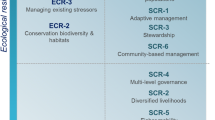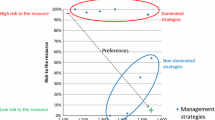Abstract
We investigate the role of potential regime shifts in Argentinean hake fishery and the inter-linkage between ecological and economic resilience. We develop a theoretical model incorporated with the hazard function for resource management under alternative conditions, and derive the corrective tax. Applying the model to the case of Argentinean hake fishery, we obtain insights for fishery management in the presence of risk for a regime shift. Based on three value functions, our model simulation indicates that the higher the relative loss from the fishery collapse, the more important the risk management would be with the resilience value taken into account. A higher level of fish stock leads to a higher optimized value and a lower corrective tax rate. When the stock level is lower, we need to introduce a higher tax rate to best avoid the fishery collapse. Decomposing the marginal value of the fish stock into a stock service value for fish production and a resilience value for flip risk reduction, we find that a higher fish stock leads to a lower tax rate because of the higher resilience of the fish stock, and hence the corrective tax rate as an instrument for managing fishery becomes less important.



Similar content being viewed by others
Notes
In this paper, we use the three terms regime shifts of fishery, fishery collapse and fishery flips interchangeably.
The difficulty of setting such a reference level is a general problem not limited to this particular study. See Cai et al. (2012) on climate thresholds.
The Matlab codes are available by request.
References
Arrow K, Dasgupta P, Goulder L et al (2004) Are we consuming too much? J Econ Pers 18:147–172
Aubone A, Bezzi S, Castrucci R et al (2000) Síntesis del estado de las pesquerías marítimas argentinas y de la Cuenca del Plata. INIDEP \(\text{N}^{\circ }\) 1129, Mar del Plata, Argentina
Boltovsky D (1981) Atlas del Zooplancton del Atlântico Sudoccidental y métodos de trabajo con el zooplancton marino, Publicación Especial del Instituto Nacional de Investigación y Desarrollo Pesquero (INIDEP), Mar del Plata, Argentina I-XXX, p 938
Cai Y, Judd KL, Lontzek TS (2012) The social cost of abrupt climate change. Working paper prepared for Conference on Climate and the Economy. Stockholm, Sweden, Stockholm University Institute for International Economic Studies
Chapin FS III, Folke C, Kofinas GP (2009a) A framework for understanding change. In: Chapin FS III, Kofinas GP, Folke C (eds) Principles of ecosystem steward- ship: resilience-based management resource management in a changing world. Springer, New York, pp 3–28
Chapin FS III, Kofinas GP, Folke C (eds) (2009) Principles of ecosystem steward- ship: resilience-based management resource management in a changing world. Springer, New York, USA, p 401
Clarke HR, Reed WJ (1994) Consumption/pollution tradeoffs in an environment vulnerable to pollution-related catastrophic collapse. J Econ Dyn Control 18(5):991–1010
Costanza R, de Groot R, Sutton P et al (2014) Changes in the global value of ecosystem services. Global Environ Change 26:152–158
Crépin A-S, Walker B, Polasky S (2011) Global dynamics, multiple shocks and resilience. Planetary stewardship and catastrophic shifts in the Earth system. Beijer Discussion Beijer \(\text{ N }^{\circ }\) 288, The Beijer International Institute of Ecological Economics, The Royal Swedish Academy of Sciences, Sweden
Cropper ML (1976) Regulating activities with catastrophic environmental effects. J Enviriron Econ Manag 3:1–15
Dato C, Bambill G, Cañete G et al. (2006) Estimación cuantitativa del descarte en la pesquería de merluza realizado por la flota comercial argentina. INIDEP Documento Científico, pp 31–38
Da Rocha JM, Cerviño S, Villasante S (2012) The Common Fisheries Policy: an enforcement problem. Mar Policy 36(6):1309–1314
de Zeeuw A. (2014). Regime shifts in resource management. Annu Rev Resour Econ 6(1):85–104
Food and Agriculture Organizaiton of the United Nations (FAO) (2014) Argentina. Country profile, 2014. http://www.fao.org/fishery/facp/ARG/es. Cited 14 Dec 2014
Folke C, Jansson Ã, Rockstrom J (2011) Reconnecting to the Biosphere. Ambio 40:719–738
Hughes TP, Bellwood DR, Folke C et al (2005) New paradigms for supporting the resilience of marine ecosystems. Trends Ecol Evol 20(7):380–386
Irusta CG, D’Atri LL (2009) Evaluación del estado del efectivo Norte de \(41^{\circ }\) S de la merluza (Merluccius hubbsi) y estimación de la captura biológicamente aceptable para el año 2010, INIDEP Informe Técnico \(\text{ N }^{\circ }\) 45, p 39
Irusta CG (2015) Evaluación del estado del efectivo Norte de \(41^{\circ }\) S de la merluza (Merluccius hubbsi) y estimación de la captura biológicamente aceptable para el año 2016, INIDEP Informe Técnico \(\text{ N }^{\circ }\) 29, p 33
Maler K-G, Li C-Z (2010) Measuring sustainability under regime shift uncertainty: a resilience pricing approach. Environ Dev Econ 15:707–719
Millennium Ecosystem Assessment (MEA) (2005) Ecosystems and human well- being: synthesis. Island Press, Washington, DC
Myers R, Hutchings J, Barrowman N (1997) Why do fish stocks collapse? The example of Cod in Atlantic Canada. Ecol Appl 7(1):91–106
Pindyck S (1984) Risk, inflation, and the stock market. Am Econ Rev 74(3):335–351
Polasky S, De Zeeuw A, Wagener F (2011) Optimal management with potential regime shifts. J Environ Econ Manag 62(2):229–240
Renzi M, Villarino MF, Santos B (2009) Evaluación del estado de explotacion del efectivo Sur de \(41^{\circ }\text{ s }\) de la Merluza (Merluccius hubbsi) y estimación de las capturas biológicamente aceptables correspondientes al año 2008 y 2009. INIDEP Informe Técnico Oficial \(\text{ N }^{\circ }\) 46, p 37
Santos B, Villarino MF (2015) Evaluación del estado de explotacion del efectivo Sur de \(41^{\circ }\text{ s }\) de la Merluza (Merluccius hubbsi) y estimación de las capturas biológicamente aceptables correspondientes al año 2016. INIDEP Informe Técnico Oficial \(\text{ N }^{\circ }\) 32, p 40
Scheffer M, Carpenter SR (2003) Catastrophic regime shifts in ecosystems: linking theory to observation. Trends Ecol Evol 18:648–656
Steffen W, Richardson K, Röckstrom J et al (2015) Planetary boundaries: guiding human development on a changing planet. Science 347:6223
Tsur Y, Zemel A (2004) Endangered aquifers: groundwater management under threats of catastrophic events. Water resources research 40(6):1–10
Tsur Y, Zemel A (2006) Welfare measurement under threats of environmental catastrophes. J Environ Econ Manag 52(1):421–429
Villasante S, Sumaila R, Antelo M (2014) Why cooperation is better? The gains of cooperative management of the Argentine shortfin squid fishery in South America. In: Barret S, Maler KG, Maskin E (eds) Environment and development economics: essays in honour of Sir Partha Dasgupta. Oxford University Press, Oxford, pp 270–294
Villasante S, Österblom H (2015) The role of cooperation for improved stewardship of marine social-ecological systems in Latin America. Ecol Soc 20(1):8
Villasante S. Macho G, Isusi de Rivero J, Antelo M, Divovich E, Harper S, Zeller D, Pauly D. (2016) Estimates of total marine fisheries removals from the Northwest of Spain (1950–2010). In: Zeller D, Pauly D. The Atlas of the World Oceans, Inland Press, Washington DC (forthcoming)
Weitzman ML (2003) Income, wealth, and the maximum principle. Harvard University Press, Cambridge, MA
Acknowledgments
The authors acknowledge the valuable comments from the two anonymous reviewers, which have greatly improved this paper. SV acknowledges the financial support from the Latin American and the Caribbean Environmental Economics Program (LACEEP), and a grant from the Galician Government (Consellería de Cultura, Educación e Ordenación Universitaria, Xunta de Galicia) (Grant \(\hbox {N}^{\circ }\) R2014/023).
Author information
Authors and Affiliations
Corresponding author
Rights and permissions
About this article
Cite this article
Li, CZ., Villasante, S. & Zhu, X. Regime Shifts and Resilience in Fisheries Management: A Case Study of the Argentinean Hake fishery. Environ Resource Econ 65, 623–637 (2016). https://doi.org/10.1007/s10640-016-0038-y
Accepted:
Published:
Issue Date:
DOI: https://doi.org/10.1007/s10640-016-0038-y




